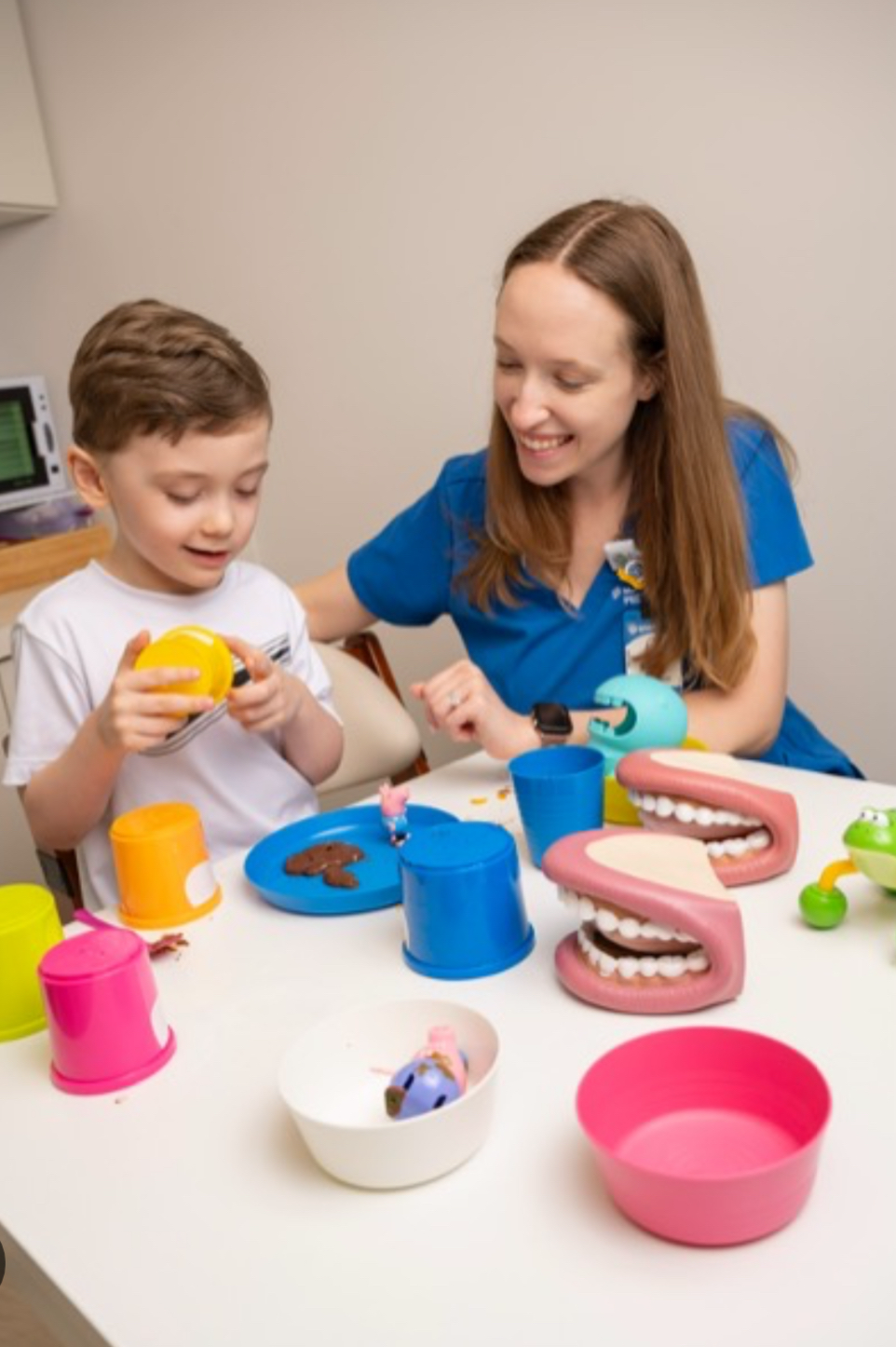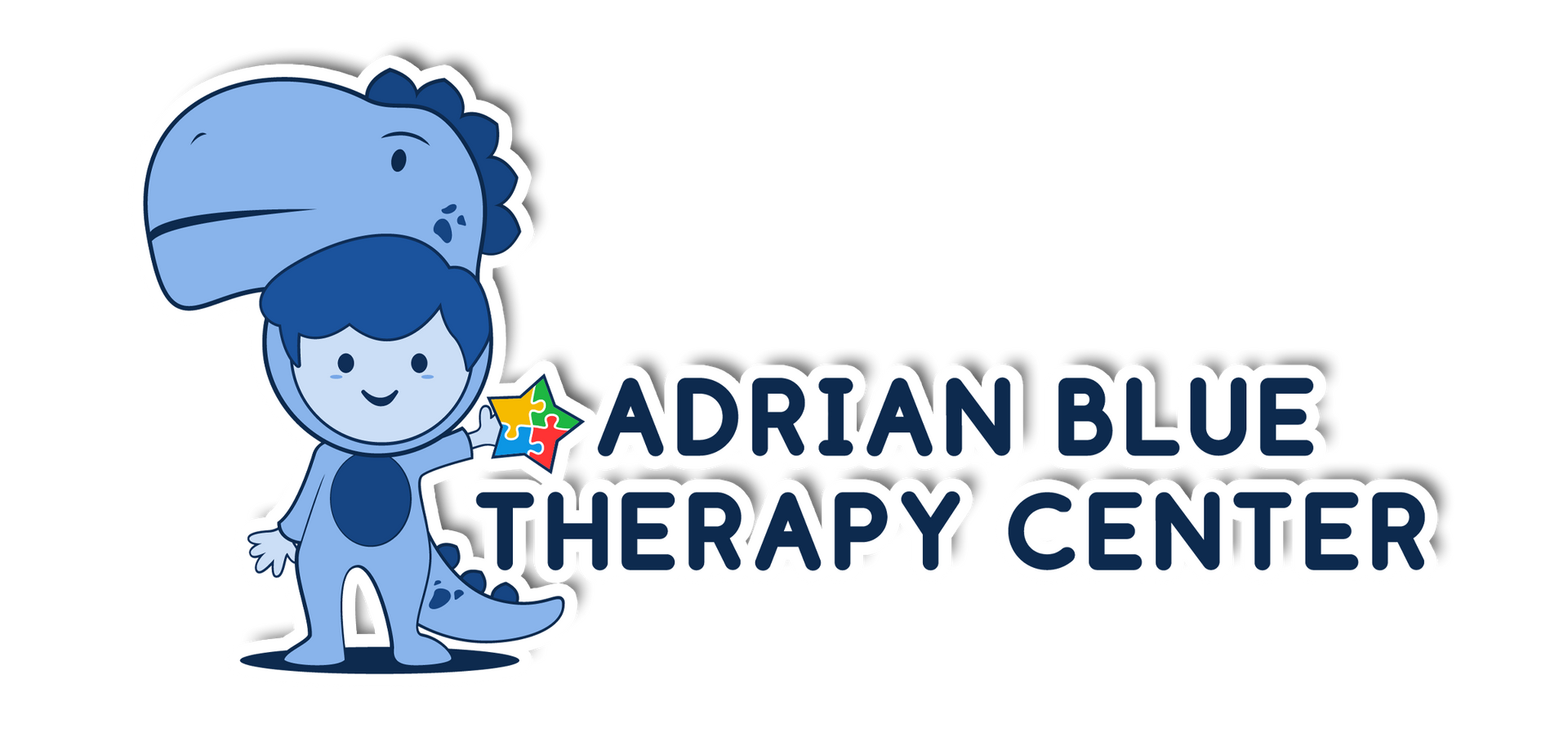Feeding Therapy
At Adrian Blue Therapy Center, we understand that choosing the right therapy provider for your child can be a difficult decision. Here are some reasons why we believe we are the best choice for your child’s therapy needs:
Experienced and Qualified Staff
Our team consists of highly trained and experienced speech-language pathologists (ST), occupational (OT), physical (PT) and behavioral (ABA) therapists who are dedicated to helping children that they need it. We stay up-to-date with the latest research and
Fun and Engaging Therapy Sessions
We believe that therapy should be fun and engaging for children. Our therapy sessions are designed to be interactive, motivating, and tailored to each child’s interests and abilities.
Parent Involvement
We recognize that parents play a crucial role in their child’s therapy success. We involve parents in every step of the therapy process, providing support and resources to help them continue to work with their child outside of therapy sessions.
Compassionate Care
We are passionate about what we do and genuinely care about the well-being of our patients and their families. We understand that speech and language difficulties behavioral and other developmental can be challenging, and we strive to provide compassionate and supportive care to help children reach their full potential.
At Adrian Blue Therapy Center, we provide personalized therapy services to help children develop better communication skills, enhance their academic performance, and boost their confidence improve your behavior and build skills. if you are looking for a therapy provider for your child, we believe that Adrian Blue Therapy Center is the best choice. Contact us today to schedule an evaluation and learn more about our services.
Feeding therapy can be provided to children who have difficulties with the different phases of swallowing, aversions to certain foods and/or textures, and fine motor difficulties causing the child to not be able to control the utensil toward their mouth.
How is the process to obtain our service?
At Adrian Blue Therapy Center, collaboration is essential to the success of our Feeding Therapy services. Here are the four key steps we follow to address feeding challenges effectively:
WORKING TOGETHER
Working Together: Steps of Our Feeding Therapy Programs
Initial Consultation and Assessment
Begin with a comprehensive consultation and assessment to understand your child's specific feeding difficulties, such as issues with swallowing phases, food aversions, and fine motor challenges. This helps us set personalized goals and create a baseline for progress.
Customized Therapy Plan Development
Based on the assessment, our team develops a tailored feeding therapy plan. This plan targets your child's unique needs, including strategies to improve swallowing, overcome food aversions, and enhance fine motor skills for better utensil control.
Implementation and Ongoing Support
Implement the customized therapy plan with targeted interventions and exercises designed to address your child's specific feeding challenges. Our team provides continuous support, monitoring progress and making real-time adjustments as needed.
Review and Adjustment
Conduct regular reviews and assessments to evaluate your child's progress. Adjust the feeding therapy plan as necessary to ensure it remains effective and continues to meet your child's evolving needs.
Helping to transform your children's diets
Feeding Therapy is a specialized service designed to address feeding and swallowing difficulties in children and adults. Feeding therapists work collaboratively with patients and caregivers to assess and treat problems such as feeding selectivity, swallowing difficulty, and oral sensitivity, among others. They use specific techniques and strategies to improve feeding and promote proper nutrition.
Benefits
Swallowing Skills Development:
Facilitates the learning of safe and effective swallowing techniques, improving safety and comfort during meals.
Reduced Anxiety and Stress:
By improving the eating experience, it reduces food-related anxiety for both patients and their families.
Feeding Therapy
If your child gags or spits out food during mealtime, they might be a picky eater. Or, certain conditions may mean your child has trouble eating or drinking. If your child refuses to eat or simply has trouble eating, feeding therapy can help.Feeding therapy is meant to improve a child’s relationship with food and improve their motor skills to self-feed. Learn more about feeding therapy below and how it can enhance your child’s quality of life.
What Is Feeding Therapy?
Feeding therapy is a form of occupational and speech therapy that teaches young children how to eat or eat better. Feeding difficulties often arise from various conditions such as sensory processing disorder or autism spectrum disorder. Breathing difficulties, such as asthma, and nervous system disorders, such as cerebral palsy, can also create challenges with eating. These conditions can make it difficult for children to swallow and cause aversions to food. Feeding therapy can address these concerns.
This type of therapy is often included under speech therapy services. A feeding therapist will determine how often your child should attend therapy sessions and how long those sessions will be. Feeding therapy can make mealtime easier for parents and reduce stress surrounding meal preparation. Feeding therapy for toddlers can help them get the vitamins and nutrients to encourage healthy growth.
Feeding Therapy for Picky Eaters
A picky eater is a person who refuses to eat certain foods. If your child is a picky eater, they might eat the same things repeatedly, such as chicken nuggets, mac and cheese, or grilled cheese. Toddlers who are picky eaters might experience nutritional deficiencies if they aren’t getting enough sustenance from their current diet, impacting their growth and development.
Picky eating might begin when your child is a toddler and peak once they reach preschool age. You can look to feeding therapy to help your children overcome picky eating habits. Feeding therapy can improve your child’s relationship with food and motivate them to try new food groups.
Benefits of pediatric feeding therapy
If you’re considering enrolling your child into feeding therapy, the potential benefits include:Improves health and growth: Children with difficulty eating can also experience difficulty maintaining an appropriate weight for their height and age. Establishing healthy eating habits can improve your child’s nutrition, which is essential for healthy growth and development.
Allows for more food variety: Children who have food aversions have a limited diet. Feeding therapy can increase their exposure to new foods, expanding the number of options during mealtime. This allows you to be more flexible when preparing meals for your children.
Reduces stress: If your child doesn’t eat a lot of variety, mealtimes can be stressful, as you have to worry about making a nutritional meal your child will actually eat. You may also have to make more than one meal for your child and the rest of your family. Feeding therapy can help your child become more comfortable with various foods, saving time during meal prep and reducing the number of meltdowns.
Encourages children to play with their food: While some parents might think that playing with food is counterproductive or bad table manners, children who play with their food develop essential skills and become more comfortable with various sights, tastes and textures. Feeding therapy encourages children to play with their food to spark their interest in new meals they might have had an aversion to before. If a child is comfortable with their food, they can become more likely to eat it.
Creates a healthy relationship with food: Feeding therapy can help create positive associations with food, replacing negative experiences or associations that may be causing your child’s aversion. Their feelings of trust and safety around new food can increase, encouraging them to explore new foods at their own pace.
Encourages self-regulation: Feeding therapy helps your child build the skills necessary to manage their emotions through self-regulation. They can observe and learn how others eat and react to food through shared connections and a calming environment. Once they’ve developed these skills, they can soothe themselves when they come across unfamiliar foods or tastes. If you remain calm and peaceful during mealtime, your child can learn to do the same.


Contact Us
Phone: (786) 536 7251
(786) 505 8558
( 786) 246 5462
info@adrianbluetherapycenter.com
3220 SW 107th Ct, Miami, FL 33165, United States.
Links
Working hours
- Mon - Fri
- -
- Sat - Sun
- Closed
We offer (ABA,ST,OT,PT) services
We are based in South Florida, serving both
Miami-Dade and Broward counties.

All rights reserved | Adrian Blue Therapy Center


